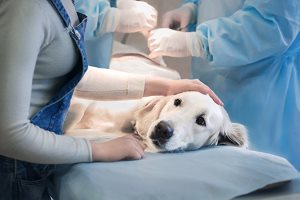Vet in Lakewood shares tips to control pet allergies
Posted by Dr. Jose Arambulo
What is an allergic reaction?
The job of the immune system is to keep potentially dangerous “invaders” out of the body and to destroy those that sneak in. One of its tasks is to expel allergens – proteins from foods, plants, insects, or animals, or chemical elements – that could irritate. Offending proteins bind with antibodies in the blood and attach to mast cells in the skin or other tissues. This causes mast cells to release histamine, potent chemicals that stimulate local inflammation.An animal may be sensitive to a benign (not dangerous) substance. Then, the normal immune response becomes harmful. Usually, as the pet is exposed to the allergen repeatedly over months or years, the immune system becomes increasingly sensitized. It reaches a point where that allergen or a similar/related one triggers an over-reaction.
Symptoms of allergies in dogs
While some breeds are more prone, any dog in any environment can have allergies. They tend to appear in adult dogs (over six months old), usually showing up by two years of age.Symptoms present as:
- Itching (in a localized area or all over the body), often with constant licking
- Dry, red, or inflamed skin or hives
- Itchy ears or chronic ear infections
- Sticky matter in eyes which may have an odor (lots of face rubbing)
- Discharge from nose
- Possible swelling of ear flaps, eyelids, lips, or face
- Sneezing, coughing, wheezing, or in flat-faced breeds “honking”
- Vomiting
- Loose stools
Signs of cat allergies
Cats can develop allergies at a younger age, sometimes as small kittens. Feline allergy symptoms include:- Sneezing, coughing, and wheezing
- If the cat has been diagnosed with asthma, worsening of the condition
- Snoring (caused by throat inflammation)
- Itchy eyes with runny discharge
- Ear infections
- Diarrhea or vomiting
- Sensitive or swollen paws caused by chewing
Call Us Today
Or
Book an Appointment
What you can do to help your pet
Symptoms of pet allergies mimic those of other medical conditions, some of which can be life-threatening. If your pet’s symptoms get worse or do not clear up within a few days, please call Bloomfield Animal Hospital right away for qualified care.Dr. Arambulo will examine the pet and possibly take skin scrapings or a blood sample. This lab workup helps to rule out other causes and to identify sensitizing allergens. Findings may be supplemented with an elimination strategy – removing one potential allergen at a time from the pet’s diet or environment, to see if the condition clears up in its absence. This can be especially helpful in determining food allergies.
Allergy treatment for dogs
 Depending on the cause of your dog’s allergies and the severity of symptoms, the doctor may prescribe anti-inflammatory therapy with corticosteroids, antihistamines, or cyclosporine to block the allergic reaction. A fatty acid dietary supplement can improve the dog’s response to treatment.
Depending on the cause of your dog’s allergies and the severity of symptoms, the doctor may prescribe anti-inflammatory therapy with corticosteroids, antihistamines, or cyclosporine to block the allergic reaction. A fatty acid dietary supplement can improve the dog’s response to treatment. Severe cases may call for desensitization therapy. A small amount of the offending antigen is injected into the dog weekly, to reprogram the immune system. About half of the dogs treated in this manner see a significant improvement, and about 25 percent get some benefit from allergy shots, such as a reduction in the use of other medications.
When you return home, bath the dog frequently with therapeutic hypoallergenic shampoo to calm inflamed, itchy skin. Shampoo therapy also removes allergens from the dog’s coat which are transferred to the skin. Flea treatment and prevention is essential.
A wide variety of food elements can cause allergies in dogs and may be layered with other causes. Food allergies typically do not respond to the medications mentioned. A strict hypoallergenic diet is the best course of treatment.
Tips to control pet allergies for cat owners in Lakewood
Treatment for cats may involve injections of cortisone or steroids to soothe reaction to airborne pollen, as well as antihistamines and a flea treatment.Help your cat recover and reduce the risk of further allergy problems by:
- Keeping it indoors
- Using regular preventive flea and tick treatment
- Switching to dust-free kitty litter
- Bathing the cat with a therapeutic, feline-specific product several times a week to alleviate itching
- Avoiding human food and feeding a prescription diet
- Giving prescribed dietary supplements to be sure the animal gets adequate nutrients
Bloomfield Animal Hospital is a trusted name in pets’ preventive, medical, surgical, and emergency care in Lakewood, CA. With a 30-year history as a family-owned pet clinic, it provides modern services in a warm, friendly environment. It’s one of the few veterinary hospitals to be AAHA-accredited.
 Dr. Jose Arambulo, owner and chief veterinarian, is experienced in treating eye, ear, and skin disorders and is especially interested in internal medicine, dentistry, and soft tissue surgery. He earned his BS in Medical Technology from the University of Santo Tomas and his Doctor of Veterinary Medicine from the University of the Philippines. He completed clinical evaluation for veterinary medicine at Purdue University in Indiana and was a veterinarian at Banfield and California before acquiring Bloomfield Animal Hospital.
Dr. Jose Arambulo, owner and chief veterinarian, is experienced in treating eye, ear, and skin disorders and is especially interested in internal medicine, dentistry, and soft tissue surgery. He earned his BS in Medical Technology from the University of Santo Tomas and his Doctor of Veterinary Medicine from the University of the Philippines. He completed clinical evaluation for veterinary medicine at Purdue University in Indiana and was a veterinarian at Banfield and California before acquiring Bloomfield Animal Hospital.
Dr. Arambulo is an active member of the American Veterinary Medical Association, Veterinary Information Network, Southern California Veterinary Medical Association, Southern California Filipino Veterinary Medical Association, and the Lakewood Chamber of Commerce.
 Our Traveling Surgeon, Dr. Zachery Smith, is a Diplomate of the American College of Veterinary Surgeons. He specializes in complex orthopedic and soft tissue surgery. While training, he worked with some of the best orthopedic surgeons in the country. He has lectured both locally and internationally. Dr. Smith plays a leading role at Veterinary Orthopedics of California, which is dedicated to providing high-level surgical services to pets.
Our Traveling Surgeon, Dr. Zachery Smith, is a Diplomate of the American College of Veterinary Surgeons. He specializes in complex orthopedic and soft tissue surgery. While training, he worked with some of the best orthopedic surgeons in the country. He has lectured both locally and internationally. Dr. Smith plays a leading role at Veterinary Orthopedics of California, which is dedicated to providing high-level surgical services to pets.
 Our visiting physician, Dr. Fred Brewer, is a veterinary cardiologist board-certified by the American College of Veterinary Internal Medicine. He completed his Bachelor of Science in Psychobiology at UCLA and earned his veterinary degree from Cornell University in 2009. Later, he completed a one-year general rotating internship at the California Animal Hospital Veterinary Specialty Group in West Los Angeles and a three-year cardiology residency at Cornell University.
Our visiting physician, Dr. Fred Brewer, is a veterinary cardiologist board-certified by the American College of Veterinary Internal Medicine. He completed his Bachelor of Science in Psychobiology at UCLA and earned his veterinary degree from Cornell University in 2009. Later, he completed a one-year general rotating internship at the California Animal Hospital Veterinary Specialty Group in West Los Angeles and a three-year cardiology residency at Cornell University.

Dr. Arambulo is an active member of the American Veterinary Medical Association, Veterinary Information Network, Southern California Veterinary Medical Association, Southern California Filipino Veterinary Medical Association, and the Lakewood Chamber of Commerce.




















